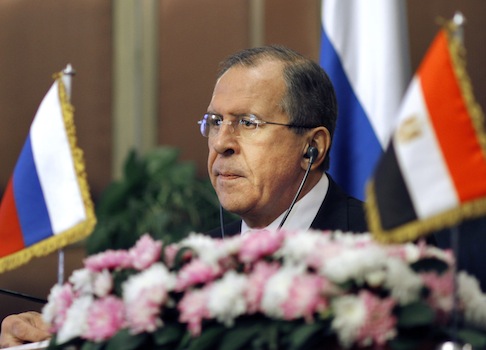Russia has agreed to provide Egypt with more than $2 billion in military equipment under a new major arms deal, according to Russian language press reports.
The Egyptian military could purchase up to $2 billion worth of attack planes, air defenses, and short-range anti-tank missiles, according to the Russian newspaper Vedomosti, which quoted sources in Moscow’s Defense Ministry and elsewhere.
The deal was announced days after Russian Foreign Minister Sergey Lavrov and Defense Minister Sergey Shoigu concluded a series of high-level meetings in Egypt.
The boost in ties between Moscow and Cairo comes as U.S. and Egyptian ties disintegrate following the Obama administration’s decision to cut military aid to the struggling nation following a coup in July.
Russia has also grown closer to Iran in recent weeks.
Egypt will likely obtain weaponry that it had been denied by the United States, according to Mikhail Margelov, the chair of Russia’s Foreign Affairs Committee, who publicly discussed the arms deal late last week.
Egypt had relied on the United States for F-16 jets and other types of advanced warplanes to fight terrorists in the disputed Sinai region and elsewhere.
Egypt is now turning to Russia for MiG-29 planes, anti-missile systems, and an assortment of anti-tank weapons that can be used to "disperse demonstrations," according to Russian media reports.
"We continued discussion of projects on military and military-technical cooperation, agreed that in the near future we will take steps on the legal framing of our agreements," Shoigu was quoted as saying in the Russia press following last week’s discussions in Cairo.
Russia and Egypt will work quickly to fully enact the military pact, according to Shoigu, who met face-to-face with Egypt’s ruling General Abdel Fattah al-Sisi.
"We agreed that in the nearest future, we will take steps for the legal implementation of our deals," Shoigu said according to the Moscow Times.
Russian decision makers admit that they are making a conscious choice to reengage in the Middle East following years of a more passive policy.
"Today, Russia is returning to a number of regions lost during the 1990s," Margelov said in a Dec. 11 interview with RIA Novosti. "This is the African continent and the Middle East."
"Even before the ‘Arab Spring’ Russia did not hide its interests in these regions and began strengthening with these countries military-technical, economic, and trade cooperation," Margelov said, citing improved ties with countries such as Syria, Egypt, Libya, and Jordan.
While it is unclear when exactly the deal will be carried out and what equipment will be included, Margelov made clear that it would include weapons that the United States had denied to Egypt.
Russia’s pivot to Egypt was expected by several experts, some of whom said that America’s withdrawal from the region has created a power vacuum.
"This news doesn't really come as a surprise," said Anna Borshchevskaya, a fellow at the European Foundation for Democracy. "When we cut off aid to Egypt, we lost leverage over Egyptian military, and others were more than happy to fill the void."
Russia has been waiting for the right time to "reassert itself in the Middle East," Borshchevskaya said.
"It's working to revive some of its Cold War relationships there," she said. "Of course they are happy to sell military equipment to Egypt—Putin wants to position Russia as a counterweight to the West in the region. This is a perfect opportunity, it fits with this plan."
Top Russian leaders including Lavrov where also in Tehran last week for high-level discussions about increasing ties with Iranian President Hassan Rouhani’s government.
The two sides reportedly talked about boosting trade relations, Tehran’s involvement in shaping Syria’s future, and the Iranian nuclear program, which has progressed with Russia’s help.
